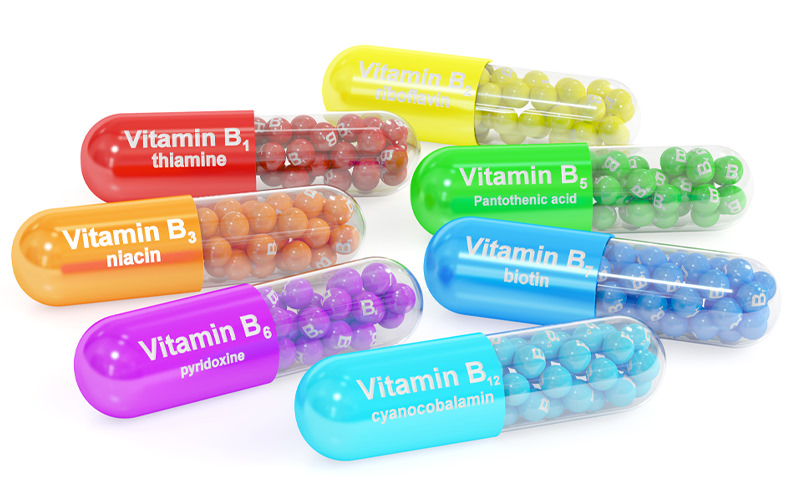There are eight B Vitamins. The B Vitamins are water-soluble and chemically distinct. Initially, the B vitamins had loose similarities in their properties, distribution and physiologic functioning. But as time went on more was learned about the vitamins and their properties and functions.
B Vitamins are used for normal metabolism (making energy), making blood cells, helping the nervous system – reducing depression, reducing heart disease risk, and reducing bad cholesterol. B12 and folate (B9) can be stored (primarily in the liver) but the rest you must get from your diet and/or supplements.
Of course, if you have any history of malabsorption, gastric bypass, celiac disease, Crohn’s disease, anemia, fatigue, depression, weakness, tingling/numbness in hands and/or feet you may have B vitamin deficiency and your levels should be assessed.
Since B12 is mostly obtained from animal sources vegans and vegetarians are often deficient and should consider testing and taking supplements.
For pregnancy, B6, B9 (folate) and B12 are needed to provide a healthy pregnancy. We are most familiar with deficiencies of these in pregnancy but there is a beginning concern of toxic amounts of these vitamins in pregnancy as well.
Here Are the 8 B-Vitamins:
- B1 (thiamine): Thiamine plays an essential role in metabolism by helping convert nutrients into energy. The richest food sources include pork, sunflower seeds, and wheat germ.
- B2 (riboflavin): Riboflavin helps convert food into energy and also acts as an antioxidant. Foods highest in riboflavin include organ meats, beef, and mushrooms.
- B3 (niacin): Niacin plays a role in cellular signaling, metabolism and DNA production and repair. Food sources include chicken, tuna and lentils.
- B5 (pantothenic acid): Like other B vitamins, pantothenic acid helps your body obtain energy from food and is also involved in hormone and cholesterol production. Liver, fish, yogurt, and avocado are all good sources.
- B6 (pyridoxine): Pyridoxine is involved in amino acid metabolism, red blood cell production and the creation of neurotransmitters. Foods highest in this vitamin include chickpeas, salmon and potatoes.
- B7 (biotin): Biotin is essential for carbohydrate and fat metabolism and regulates gene expression. Yeast, eggs, salmon, cheese, and liver are among the best food sources of biotin.
- B9 (folate): Folate is needed for cell growth, amino acid metabolism, the formation of red and white blood cells and proper cell division. It can be found in foods like leafy greens, liver, and beans or in supplements like folic acid.
- B12 (cobalamin): Perhaps the most well-known of all the B vitamins, B12 is vital for neurological function, DNA production, and red blood cell development. B12 is found naturally in animal sources like meats, eggs, seafood, and dairy.
SPECIAL BONUS:
Where are you on your Mental Wellness Journey? I have several slots open this week to help you explore you and your journey. That is a 30-minute phone call devoted to only you. This is complementary to the first 3 people to email us at info@lauriegoldmanmd.com.
_____________________________________________________
Dr. Laurie Goldman is a medical doctor, psychiatrist, and functional medicine practitioner who’s been in private practice since 1999. She founded Clear Path Wellness to help her patients reach their maximum state of mental and physical health using a personalized, comprehensive approach powered by the principles of functional medicine, which treats the whole person, not just symptoms.
About Clear Path Wellness | Services | Contact

